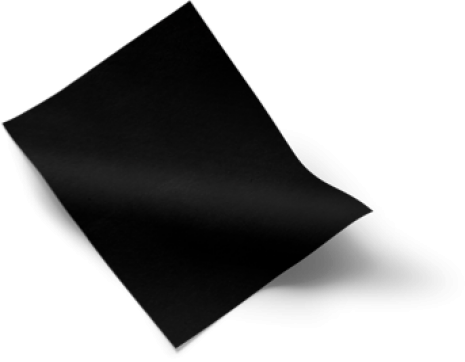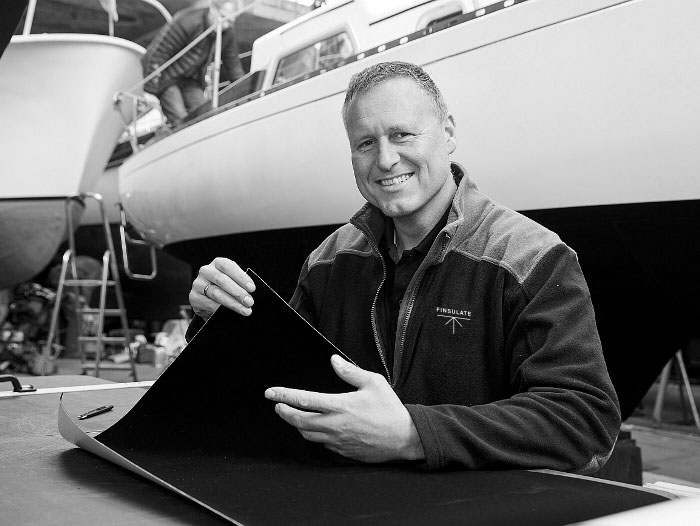It is a tradition every year: the antifouling treatment. For pleasure boats, this necessary treatment of the underwater hull is an annual expense and a good time to inspect the ship and carry out some repairs.
Commercial shipping requires extra expense for maintaining the underwater hull and treating antifouling. After all, the ship is stationary and does not earn money. In addition, the number of square meters that must be treated with antifouling paint never decreases.
How nice would it be if the annual antifouling treatment could be extended to eight years? No one dares give an eight-year guarantee on antifouling unless it is revolutionary, such as Finsulate.
Revolution in antifouling
The range of antifouling paints and alternatives is overwhelming, making it difficult to understand the best antifouling method for your ship. Stricter legislation in countries such as Sweden, England, Germany, and America forces ship owners and shipyards to consider different ways to treat the underwater hull.
Because the message is slowly getting through to everyone, traditional antifouling dissolves in the water, and its elements, copper and zinc, kill life in the sea. Scientists speak of ‘toxic skid marks from ships’.
New antifouling? Go eco-friendly with an 8-year warranty
Fortunately, man is innovative, and the antifouling paint industry has developed biocide-free alternatives. Problem solved, you might think. But the paint itself also dissolves even faster than with traditional toxic antifouling. And it is precisely that paint that causes even more plastic pollution in the oceans. It seems to be the solution, but unfortunately, it is not for the environment.
Plastic-free oceans and rivers
Microplastics are accumulating in our environment. These tiny plastic particles are persistent, mobile and difficult to remove from nature. Scientists and citizens are increasingly concerned.
We now find microplastics everywhere in soil and seas, the ocean’s depths and pristine areas such as the Arctic, and the food and water we eat. All ecosystems are affected, and no food chain is left untouched. This presence contributes to the pressure that has pushed the world beyond the limit of chemical pollution. The risks associated with high levels of human exposure cause great concern.
Microplastic pollution also negatively impacts economic sectors that depend on healthy soils and clean, plastic-free rivers and oceans. As part of the European Green Deal, the EU has taken action to combat microplastic pollution on all fronts and to reduce microplastic emissions into the environment by 30% by 2030. The EU calls for ambitious action on the international stage, particularly in the negotiations to deliver a legally binding instrument to end plastic pollution.
How can you contribute to a better environment?
We are realistic enough to understand that in this world, environmentally friendly action must go hand in hand with an affordable price tag. However, those who opt for biocide-free paint will soon be confronted with the fact that this paint will also be on the banned list.
European boat owners use at least 150,000 tons of biocide-containing antifouling paint every year. Each square meter of antifouling paint contains approximately 15 grams of biocide, which can pollute 150,000 m3 of water. The impact on underwater life is enormous.
Worldwide, the figures are even more shocking: More than 100 million litres of toxic antifouling paint are floating in the oceans. The composition of this paint is under pressure, but not everywhere. Biocides are being banned, particularly in Europe and several American cities. However, this is not a real solution because even if everyone were to use biocide-free paint, the carrier, the paint, would eventually dissolve into microplastic particles, an estimated 25 to 50 million kilos.
Blue Economy Index
We are pleased that the Blue Economy Index has been launched. The Blue Economy Index is a key tool in the strategy that the Prince Albert II of Monaco Foundation has been pursuing for several years to combine philanthropy and impact investing to actively participate in the emergence of sustainable solutions for the ocean. The Blue Economy Index will be a benchmark for creating tailor-made structured products contributing to a cleaner ocean.
Prince Albert II also welcomes the initiative: “Because we are particularly affected by all our human activities, reconciling economics, finance, and the preservation of natural resources is essential if we want to restore marine ecosystems and build resilient, low-carbon societies.”
Environmentally friendly cooperation is a great goal that can only work if everyone is on the same page. The EU is already forcing us in a specific direction with a ban on toxic antifouling, and with Finsulate, you can also do your bit for a cleaner ocean.
What is Finsulate?
Finsulate is a unique deep black foil glued to the underwater hull. This protective foil insulates the hull. The foil feels like velvet because of the many short spines, which make it virtually impossible for algae and barnacles to attach. If there is any growth, it is on the top of the spine and can easily be wiped off.
Finsulate is a Dutch invention by marine biologist Rik Breur. He discovered that the spines of a sea urchin have a repellent effect against the growth of algae and mussels. This insight earned him the European Inventor Award in 2019. Finsulate was slowly launched and carefully measured for operation and durability over several years. Now that ships have been sailing with Finsulate for more than ten years, an eight-year warranty is given on the installation with confidence.
Eight-year warranty on antifouling
This method of protecting the underwater hull is unique and revolutionary. With millions of sea urchin spines on the hull, the underwater hull is no longer a toxic time bomb but a floating part of maritime life. There are no more poisonous skid marks in the sea, no more dangerous cans of paint on the shipyard, and no annual costs for reapplying antifouling paint; you can easily add up the benefits yourself. Contact Finsulate to get a quote for your ship. A better environment starts with you today!





